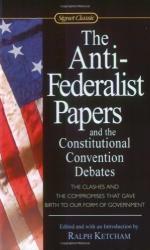
|
| Name: _________________________ | Period: ___________________ |
This quiz consists of 5 multiple choice and 5 short answer questions through Chapters 35-38.
Multiple Choice Questions
1. Alexander Hamilton gave a speech that expressed what value?
(a) The value of a strong federal government.
(b) The value of low tariffs.
(c) The value of abolishing slavery.
(d) The value of independent states.
2. What did delegates debate on June 6?
(a) How to limit the executive's power.
(b) How to declare war.
(c) How to elect members of the House.
(d) How to appoint judges.
3. How did Patrick Henry describe fear?
(a) As the passion of slaves.
(b) As the paralyzing emotion.
(c) As the restraint of the wise.
(d) As the enemy to reason.
4. What kind of rulers did James Madison believe the country needed?
(a) Old world aristocrats.
(b) Innocent, smart individuals.
(c) Wise, virtuous individuals.
(d) Leaders with frontier experience.
5. What did the draft of the Constitution contain concerning slavery?
(a) The draft outlawed the importation of slaves.
(b) The draft outlawed the domestic slave trade.
(c) The draft did not mention slavery explicitly.
(d) The draft prevented a tax or prohibition on slavery.
Short Answer Questions
1. What did the Virginia Plan propose to do to the Articles?
2. What complaints were lodged against the proposal to elect Senators in state legislatures?
3. What resolution was ultimately adopted?
4. What did the convention call for on July 26?
5. What reason did delegates give for Senators being elected in state legislatures?
|
This section contains 340 words (approx. 2 pages at 300 words per page) |

|




